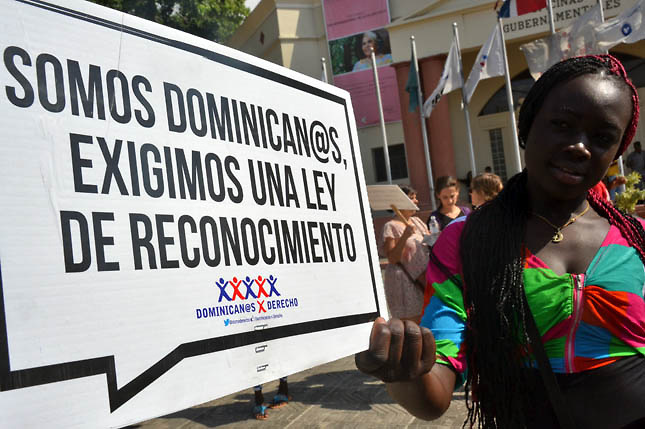Understanding the current crisis in the Dominican Republic:
- In 2013 a Dominican constitutional court ruled to revoke the citizenship of anyone born in the D.R. after 1929 to Haitian immigrant parents.
Why 1929?
In 1929 the border dividing Hispaniola into the modern day boundaries of the D.R. and Haiti was officially drawn up and established.
- This ruling effectively rendered a group of tens-of-thousands of people stateless. For many Dominicans of Haitian descent, the D.R. is the only home they’ve ever known; in regards to their cultural identity and experiences they are in all ways Dominican. Many have never set foot in Haiti, do not speak Creole, and have no connections to family, or friends in the country.
- The D.R.’s solution to the denaturalization of tens-of-thousands of people was to force any of those who fell into the above category – or who were [unofficially] under suspicion of being in the above category based on physically “Haitian” features – to either prove their Dominican heritage*, register as undocumented workers with the Dominican government, or face mass deportation to Haiti (Where they also don’t have citizenship**)
* There have even been reports of officials confiscating the Dominican birth certificates of individuals who don’t appear Dominican.
** While Haiti’s Constitution grants Haitian citizenship to anyone with Haitian parents, this citizenship is not automatically conferred to anyone who claims it. More importantly, most of the Dominicans of Haitian descent do not see themselves as Haitian.
- Out of the 250,000 Dominican Haitians who have tried to apply for work permits in accordance with the ruling, it is reported that only some 300 have received them. Many more have resisted, or actively refused to register, insisting on their full and equal rights as Dominican-born citizens*.* Under Dominican Law, the qualifications for Dominican citizenship for children born on Dominican soil is left purposefully unclear: According to the law, individuals born in the D.R. are Dominican citizens, with the exception of those who were born to people “in-transit” or to foreign diplomats. So, according to the 2013 ruling, it would seem that the D.R. considers tens-of-thousands of people to have been “in-transit” for more than eight decades.Another important fact: Many of the Haitian people who came to the D.R. before 1929 did so legally; the Dominican government hired thousands to help harvest sugar cane, and later on to help in other areas of agriculture and construction.
- The deadline to register passed yesterday, June 17, 2015. Now the world is waiting to see if and how the D.R. authorities will follow-up on their threat for mass-deportations.

Photo by: Orlando Ramos/Acento.com.do Date: 08/04/2014 Original Caption: El movimiento Dominicanos por Derecho realizó una vigilia frente al Palacio Nacional, donde demandaron al presidente Danilo Medina que envíe al Congreso Nacional una Ley de reconocimiento de la nacionalidad adquirida. Santo Domingo, República Dominicana [Members of the “Dominicanos por Derecho” movement held a protest in front of the National Palace where they demanded that President Danilo Medina send a law before the National Congress to recognize the legitimacy of acquired citizenship.] Her sign reads: We are Dominicans and we demand a law for equal recognition
Dominicans of Haitian Descent – These are the people currently facing statelessness. People whose identity is based on their life in the Dominican Republic. People who speak Spanish, and are being threatened with the prospect of being returned to a country where they no longer have family, connections, or opportunities. (And no language skills!)
Haitians (in Haiti) – If this comes to pass, the burden of these refugees will be dumped on Haiti. Haiti will then have the responsibility of caring for tens-of-thousands of displaced persons.
Haitian Migrant Workers – Even those who are in the country legally have faced increased incidences of violence and discrimination over the past years, this law only increases their visibility among the Dominican people.
Dominicans – This decision is the continuation of a history that long precedes the 2013 ruling. While many Dominicans have decried the ruling (Dominican authors Julia Alvarez and Junot Díaz have been among the more vocal dissidents) the ruling itself perpetuates a legacy of racism and violence against Haitians in the D.R.; something that most Dominicans would like to move beyond.

Photo By: Ariel Díaz-Alejo Date: 11/03/2013. Original Caption: Vigilia – Ayuno frente a la JCE, encabezada por los miembros del movimiento RECONOCIDOS, en demanda de que sean dotados de los documento de identidad necesario a cientos de dominicanos de ascendencia Haitiana, los cuales la JCE se niega a reconocer. [Demonstration in front of the JCE, led by members of the RECONOCIDOS movement, demanding that the hundreds of Dominicans of Haitian descent whom the JCE refuses to recognize be given their identity papers.] His sign reads: “I’m Dominican, like you”
One such petition is available here:
http://petitions.moveon.org/sign/haitians-deported-from.fb50?source=s.fb&r_by=800450
For more information, perspectives, and commentary, please visit the links below:
[One young-woman’s story of displacement]
http://harpers.org/archive/2015/05/displaced-in-the-d-r/
[NPR’s Audie Cornish talks to Michele Wucker, author of Why the Cocks Fight: Dominicans, Haitians, and the Struggle for Hispaniola, about the tensions between Dominicans and Haitians since 1929.]
http://www.npr.org/2015/06/17/415274544/haitians-face-deportation-from-dominican-republic-as-deadline-nears
[NPR’s Democracy Now Interview with Haitian-American Author Edwidge Danticat]
http://www.democracynow.org/2015/6/17/the_dominican_republics_ethnic_purging_edwidge
[Authors Julia Alvarez, Edwidge Danticat, Junot Díaz, and Mark Kurlansky co-wrote this article which appeared shortly after the 2013 ruling. Alvarez and Díaz are Dominican American; Danticat is Haitian American.]
http://articles.latimes.com/2013/nov/10/opinion/la-oe-kurlansky-haiti-dominican-republic-citizensh-20131110
Written by Erin Nguyen on June 18, 2015

